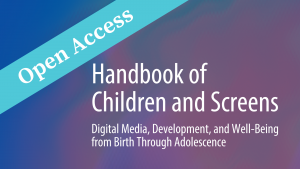
Children and Screens: Institute of Digital Media and Child Development has announced the appointment of Dimitri A. Christakis, MD, MPH, as its inaugural Chief Science Officer. The author of 260 original research articles, a textbook of Pediatrics, and The Elephant in the Living Room: Make Television Work for Your Kids, Christakis is a nationally-recognized expert in pediatric research with an H-index of 95, whose passion for optimizing the cognitive, emotional, and social development of children has taken him from the exam room to the community, and most recently to cages of newborn mice. With Christakis on board, Children and Screens will build on the strength and prestigious reputation of its existing work: the funding and dissemination of scientific research focused on the impact of digital media on child development, and the translation of those findings into programs and policies that promote child wellness.
“As someone who has been involved with Children and Screens since its inception, I am extremely excited to take on this new role for this fabulous organization,” Christakis commented. “Never have screens been more central to children’s lives, and, now more than ever, we need transdisciplinary science to guide us as we try to help children live healthy lives in a digital world.”
As Chief Science Officer, Christakis will ensure that the Institute’s work is rooted in rigorous, interdisciplinary, objective scientific research on the impacts of digital media on infants, toddlers, children, and adolescents. He will develop a short and long-range roadmap of research and public-education programs to support the vision of the Institute, oversee the scientific programmatic/research elements of Institute-hosted convenings such as the Digital Media and Developing Minds Congress, lead an interdisciplinary seed-grant process, and serve as its the scientific representative and spokesperson. He will also facilitate communication and collaboration among interdisciplinary experts across academic disciplines, clinical practice, government agencies, and other professionals, working directly with youth to improve the Institute’s knowledge base.
Christakis graduated from Yale University, received his medical degree from University of Pennsylvania School of Medicine, and completed a pediatric residency followed by a Robert Wood Johnson Clinical Scholarship at the University of Washington, from which he received his MPH. In 2010, Christakis was awarded the Academic Pediatric Association Research Award for outstanding contributions to pediatric research over his career. He is the George Adkins Professor of Pediatrics at the University of Washington, Director of the Center for Child Health, Behavior and Development at Seattle Children’s Research Institute, Editor and Chief of JAMA Pediatrics and an attending pediatrician at Seattle Children’s Hospital. He is also a frequent face in the media, having appeared on CNN, NPR, Today, CBS News, ABC News, and NBC News.
“Dimitri has been an instrumental part of the growth of Children and Screens over the past ten years, so we couldn’t be happier to be adding him to our team in this more official capacity,” added Executive Director Kris Perry. “We have an ambitious agenda set for 2023, and we look forward to collaborating with Dimitri in this new role to help ensure that our work continues to be rooted in the strongest possible data and research available.”
In addition to the appointment of Christakis to the role of Chief Science Officer, Children and Screens has also appointed Kate Blocker, PhD, to the position of Director of Research and Programs, Jill Braunstein to the position of Director of Marketing and Communications, and Celeste Schaefer Snyder to the position of Director of Media and Creative.
ABOUT CHILDREN AND SCREENS: INSTITUTE OF DIGITAL MEDIA AND CHILD DEVELOPMENT
Since its inception in 2013, Children and Screens: Institute of Digital Media and Child Development has become one of the nation’s leading non-profit organizations dedicated to advancing and supporting interdisciplinary scientific research, informing and educating the public, advocating for sound public policy for child health and wellness, and enhancing human capital in the field. As public educators in the field, we provide families, educators, clinicians, and policymakers summaries of research findings and compelling evidence about the cognitive, psychosocial, emotional, physical, and behavioral impacts of digital media use in infancy, toddlerhood, childhood, and adolescence.


